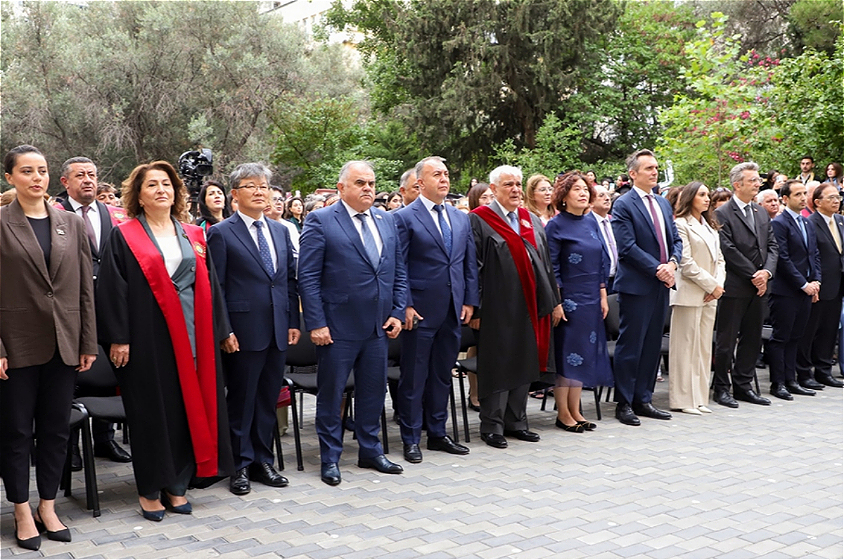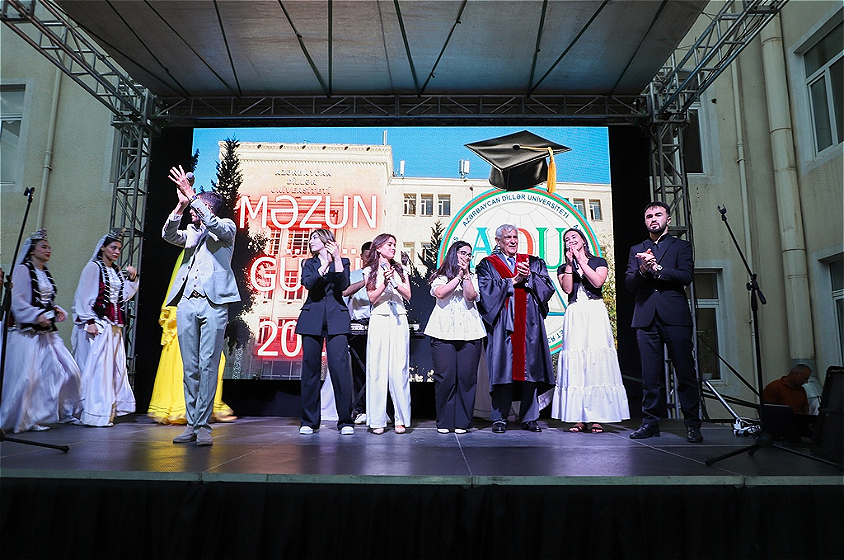Graduate Day 2025 within the walls of beloved AUL

Graduate Day 2025 within the walls of beloved AUL
Of particular importance to me is the Azerbaijan University of Languages (AUL) - an educational institution whose doors have been open to me for 33 years. It was here that I again experienced vivid emotions on the day of release - 2025. On the same day, the final meeting of the Academic Council was held at the end of the 2024-2025 academic year. The next school year has come to an end, and we, as a team, look forward to the beginning of the next stage.
Today, AUL is recognized as one of the prestigious universities not only in the field of language teaching, but also in the humanities and international relations. The university actively cooperates with foreign higher educational institutions, implements double diploma programs, student exchange and scientific projects. In the field of studying modern languages and cultures, AUL occupies a leading position in the country.
For me, AUL occupies a special place also because I myself am a graduate of it - here I received my first higher education. I also started my career at this university. For me, it's not just a place of work - it's a part of my life, from my student years to the present day, my native space.
For many years, spiritual and academic values have been preserved and developed in AUL. Under the leadership of the rector, Academician Kamal Abdulla, these traditions are enriched with modern approaches and successfully continued.
Kamal Abdulla is a bright image of my student years, favorite teacher
Kamal Abdulla was a bright figure of our student years, a favorite teacher. Remembering those years, we, his students, often say that as soon as he entered the audience, the word seemed to find its own way, and the beginning of the lecture coincided with the sounds of his footsteps. His speech was so clear, smooth and expressive that it was a real pleasure to listen to it.
During yesterday's Graduation Day, I again realized that student years are one of the most valuable and unforgettable pages of human life. Only looking back, you begin to realize how fast time is running. How quickly these years flew by...
It was the professional advice and direction received from Kamal Abdulla, that played a decisive role in my first steps on the scientific and pedagogical path after graduation. I always remember with gratitude the support and attention he gave at that time.
In recent years, important steps have been taken in AUL to modernize and internationalize the university in accordance with the requirements of the time. The material and technical base has been strengthened, teaching methods have been improved, the principles of transparent and student-oriented management have been introduced.
AUL has turned into an educational institution offering unique educational programs based on international teaching models and broad partnerships. The university actively cooperates with universities in Turkey, the USA, Great Britain, France and other European countries. Thanks to this cooperation, academic exchange has been significantly intensified, the methodology of teaching and learning has been improved.
The reforms and international partnerships carried out in the AUA contributed to strengthening the authority of the university and the professional growth of teachers and students. The activities of the AU in the field of literature and culture serve as a source of inspiration for philologists.
One of the most significant achievements was the inclusion of AUL in the rating of 201-250 best universities in the world in the direction of "Modern Languages" according to the Quacquarelli Symonds (QS) agency for 2025. This means an increase of 100 positions compared to previous years: in 2023 and 2024, the university ranked 301-340th.
The QS rating is based on five key indicators: academic reputation, reputation among employers, number of citations per publication, Hirsch index (H-index) and international scientific cooperation index. The progress achieved on these indicators indicates the growth of international recognition and quality of the university's academic activities.
At the same time, significant steps have been taken to expand international relations. AUL implements joint programs with many foreign universities, including double diplomas, student exchange and scientific projects. Thus, within the framework of the "Erasmus+" program, our students have the opportunity to study at universities in different European countries.
More than 20 centers operating at the university and representing different countries are engaged in the study of the culture, history and literature of these states. Within the framework of the "Hour with Ambassador" club, meetings with diplomats are held, the experience of foreign universities is studied, and teacher training programs are implemented. It is no coincidence that this year the Graduate Day was attended by ambassadors from more than 10 countries.
The university's initiatives go far beyond the ratings. A vivid example is the II Regional Conference on "Improving the professional skills and abilities of graduates of the Azerbaijan University of Languages", held on April 3, 2025. The event covered the districts of Balaken, Gah, Gabala, Oguz, Sheki and Zagatala and lasted two days. Within the framework of the conference, the rector of AUL, Academician Kamal Abdulla, and the teaching staff of the university held meetings with regional graduates, participated in seminars and discussions. Such initiatives are important both for strengthening ties with graduates and for cultural and scientific exchange with the regions.
On May 6, the university held the VIII International Scientific Conference dedicated to the 102nd anniversary of the birth of national leader Heydar Aliyev, on the topic "Heydar Aliyev: the ideology of multiculturalism and tolerance". The participation of such prominent scientists as the Rector of the University of Ankara, Professor Nejdet Yunyuwar, Rector of the National University of Modern Languages of Pakistan, Major General Shahid Mahmoud Kayani, Rector of the University for Foreigners in Perugia, Professor Valerio de Cesaris, is an indicator of the breadth of international relations of AUL. The conference became a platform for scientific discussions, establishing partnerships and starting new joint projects.
AUL on the way to rapid and purposeful development
All these achievements - and many others not covered by this text - testify to the rapid and purposeful development of AUL both from the point of view of the scientific environment and the educational strategy.
Of particular importance for me was the release of the new issue of the specialized magazine "Khazar", the official printed organ of the Center for Translation Studies of the AUL, which played an exceptional role in the formation of the Azerbaijani school of translation.
Khazar magazine is a part of my personal history and family heritage. My father, Zakir Fakhri, took an active part in its creation and activities. Together with him, we presented the reader with many works of world literature, as well as translations and literary reviews. It was not only a scientific path for me, but also an unforgettable experience shared with my father.
Although the publication of the magazine was temporarily suspended, its spiritual value and idea continued to live. The revival of "Khazar" in a modern format became possible largely due to the invaluable support of the respected Kamal Abdulla. He, acting not only as a rector, but also as an intellectual, writer and a man of culture, put his soul into the revival of the magazine.
That is why I consider the current issue of "Khazar" as the beginning of a new stage. As a writer, I sincerely believe that the continuation of the life of the magazine, its role in the popularization of world literature among the new generation is a worthy continuation of the path started many years ago by me and my father.
Dear young people, Azerbaijan University of Languages is waiting for you!
Modern youth show a keen interest in literature, but the forms of its expression have changed. It is important to direct this interest in the right direction and fuel it with modern approaches. Today, young people perceive literature not only in the traditional form - through printed books, but also through social networks, podcasts, electronic and audio books, video content. Interaction with literature has become more flexible, technological and interactive.
We, the teachers, must take into account these changes and update the methodology to keep students interested. For example, in classes we combine classic texts with modern technologies: video analysis, interactive presentations and discussion seminars. This helps students to form modern literary thinking and brings them closer to literature.
I also notice that poetry and prose receive a wide response on social networks. The creativity of young authors, modern poems and stories find their reader on platforms such as Instagram, TikTok and YouTube. This indicates the transformation of forms and channels of distribution of literature, its adaptation to a new lifestyle.
The main thing is to inspire young people not only to read, but also to reflect, interpret texts, look at them from different angles. Literature - classical and modern - plays an important role in the formation of the spiritual world and aesthetic taste of young people. Therefore, we, teachers, must continue to look for ways and methods that will help them fall in love with literature.
I would advise our students and applicants, first of all, to constantly read, learn and be open to the world. Literature is a living substance that forms a person of the present and the future, preserving the imprints of the past. Deep knowledge of both Azerbaijani and world literature is extremely important, because each literary work is a reflection of thinking, spirituality, history and cultural heritage of the people.
Being a philologist nowadays means not only being able to work with texts, but also to have analytical thinking, understand different cultures and build bridges between them. This is possible only thanks to broad erudition and research work. Development of research skills, ability to work with sources in different languages - all this reflects the intellectual and professional level of young philologists.
Learning foreign languages is a way to understand other worlds, broaden your horizons and form global thinking.
Language acquisition is, in fact, a knock on the door of another people, the way to its inner world. Each new language is a window to a new culture, and the more such windows, the richer our view of the world.
And finally, I want to emphasize: if you love language and literature, you will definitely succeed. The main thing is to be persistent, strive for renewal and be open to development. Don't forget: literature is a companion for life. It nourishes the soul and enriches a person with the values that distinguish him in society.
Dear young people, AUL is waiting for you!
Doctor of Philological Sciences, Professor
Ainur Sabitova



